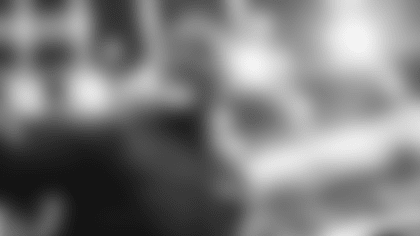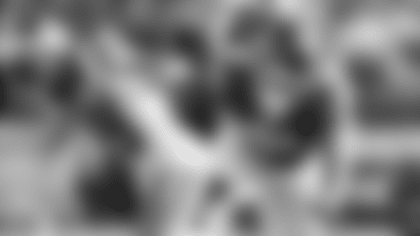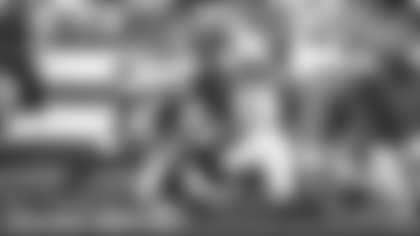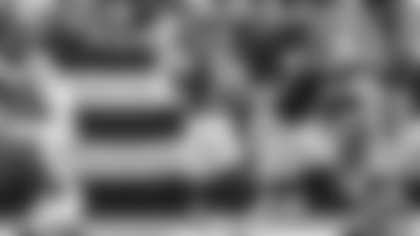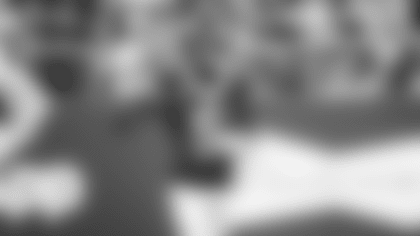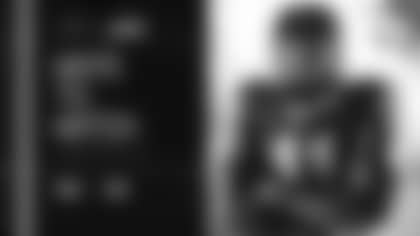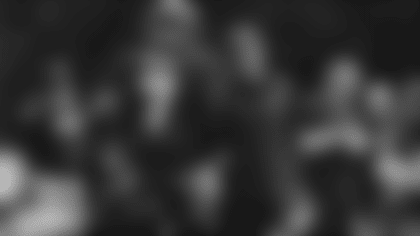Transcript of Jets head coach Eric Mangini's news conference before Thursday's midday practice:
Today we're on the same pattern that we have each and every week. I know that shocks everybody [smiles]. There are some things that we switch up in terms of emphasis and things like that, but it stays pretty consistent.
The one thing that I have been happy with, and talked to the team about, is the distribution that we've been able to have offensively in terms of the volume of receivers that have been able to catch balls and the volume of catches that different receivers have had. I think one of the really positive things about that is it forces the defense to defend the whole field, and that's what we're looking for.
I'd say on the flipside, defensively, we had good production in terms of sacks. What I like about that is there are nine different players involved in those sacks. That now forces the offense to defend the whole perimeter of the defense because you can bring different players and you can bring different combinations of guys.
It also is a good indication that we're getting the things done that we need to get done in terms of the blitz concepts. Guys are hitting the right spots, which is opening up some areas for other players. That's something that I want to be able to continue to do throughout the course of the year.
What I'm looking for in practice each day is following the consistency model of good individual periods of working on weaknesses and getting better at those things, and then moving into good solid team periods and finishing strong. Practice has been pretty much on time. Each one of the days, the amount of time allotted is the same. What's important to us is to get the maximum amount of preparation, maximum amount of improvement and maximum amount of work in that time allotted.
On if Justin Miller will play against Oakland…
We'll have to see. It will come down to special teams decisions. When you have a group that's overall pretty healthy, then those decisions come down to who can add the most value and who can contribute the most plays. We'll see how it goes here today and tomorrow. It's usually a gameday decision. We'll make that later in the week. At this point, it will come down to more of a coaching decision.
On David Clowney…
He's making progress. With his type of injury, it's not just the running around and the cutting, but it's also getting more involved in contact and making sure that everything is where it needs to be in terms of the healing process. I think he's making strides, but we're going to go through the full amount of time to make sure that he's where he needs to be.
I think Jason Trusnik is making some good progress. At some point we'll probably reactivate him. I don't know exactly when that will be, but he's making some steps forward as well.
On Mike Nugent…
Looking at kickers with similar injuries, timetables and things like that, there is no consistent timetable, there's no consistent pattern. I'd say that's true with any of these injuries. You have to look at each guy. The one thing with Mike is you know he's going to do everything you ask him to do and he's going to do it to the best of his ability. We're just pushing along. He'll be out whenever he's ready.
On Oakland RB Darren McFadden…
He's an excellent athlete. He has great speed and the ability to separate from a defense. You saw his athleticism when they put him in the backfield — running, throwing, different types of runs, one where he was the primary ballcarrier and one where he was running options. There was a read element to it. With the passes, I don't know how many touchdowns he threw [in college], but he definitely threw some. That whole range of things he can do, and it's translated here into pro football, 5.1 yards a carry. Pretty good average.
On if McFadden's level of talent makes the transition to the NFL easier…
It just depends on what system he's going into, how much he's going to be using that system, what his role is going to be, how much he's going to be used in the passing game, what protections. It's hard to say what that adjustment will be because it really varies team to team based on what he's going to be asked to do.
On if the improvement in the run defense can be attributed to Kris Jenkins…
It's everybody. It's the whole group being able to play coordinated defense better — technique, fits, hand placement, perimeter run support and tackling. All those things come into play. I think Kris has made a really nice contribution. Calvin [Pace] has made a nice contribution. I think we're playing better, collectively. A lot of the runs, once they pass that first layer of defenders, now is it going to be 12, 15, 20? When it gets in the secondary, 60? That dramatically affects the average.
On how Jenkins makes his teammates better…
I think he does some really positive things because he's a big body and he's athletic. He plays with good technique. He gets a lot of attention. Those things are all positive. That's really just one element. You can run outside and not have to deal with him. If that part of it is not sound, then he's neutralized. If you do run inside and you double-team him, whoever is coming up has to be able to take on the ballcarrier, take on the lead blocker, get the right fit, push it to the unblocked guy or the singled-up guy. They have to be able to make the play.
On Hank Poteat…
I think he can help us. I've known Hank a long time. He's very consistent. He can do a lot of different things. He has played safety, he has played corner, he has played inside in sub, whether it be "star" or "money." That versatility is really important because you don't know where you're going to get an injury or where you're going to be light. To have a guy that can play multiple roles is always positive.
On if the Jets are a franchise that is waiting for the other shoe to drop…
I don't think you can summarize a franchise, any franchise in any sport, that way. I think the thing that's unique about sports is that every year is different. It doesn't matter what happened in the past. You learn from it. You're going to make progress. Each year is its own unique year. I don't think any franchise has a certain defining characteristic that has to be that way over time.
On the optimism of the team this year…
I have felt good about this group for a long time. The one thing that I always say when I talk about the group — the people, the players and the potential — is that's what it is. It's good people, it's good players, it's good potential. You have to marry that potential with work, consistency and execution. Otherwise, it's just good people, good players and good potential.
On what being ranked 28th against the pass means…
In any game it just depends on the situation in the game. If you get up on a team early, there's going to be a lot of passes, and there's going to be more completions and more yards. I like the fact that we have been able to pressure the quarterback. You don't pressure the quarterback unless the receivers are covered. It's never done in a vacuum. Those sacks haven't come just because we've beaten somebody. It's being able to beat those offensive linemen or blockers, but that only happens if the guys down the field are covered.
I think we've done some good things. We've made some improvements with completion percentage, with interceptions. It's like anything else: We're trying to get better. The secondary will play better, too, as the rush continues to improve.
On an assessment of the division being a game out of first and a game out of last…
That would be my assessment. I don't really go through that. To me, if we take care of the games that we play, all of that other stuff will fall into place. Where we are at Game 5 really doesn't matter.
On differences in the Raiders offense with new head coach Tom Cable…
I think there are some differences. There is always going to be differences when you make a change. I think there are a lot of similarities, too. It's been a week, or a little more than a week there. It's hard to radically transform an offensive system in that amount of time. I don't know if that would be the best approach, anyway, because you have so many reps built up with OTAs, training camp and the early part of the season. I think there will continue to be unique things that show up that are specific to the changes that were made. It's hard to have just a complete overhaul.
On if teams aren't throwing deep to try and avoid Kerry Rhodes…
I think Kerry is a good player. Typically, it's hard to avoid the free safety because he's in the middle of the field. I don't know what the approach has been in any given game. I think in terms of interceptions or sacks or whatever it is, it's like anything else — if you get too caught up in that, as opposed to just working on technique, working on the overall performance of the group, then you can sometimes have dropoffs in other areas. You don't want that to happen.
Kerry has good ball skills, the ability to read the quarterback, he makes breaks and all those things. Like anything else, the interceptions will come when there are opportunities and if we're in place to take advantage of those opportunities.
On how they evaluated whether Jenkins could still play at a top level…
We looked at his body of work. We spent time with him. We really did a lot of research based on all the information as opposed to just one or two seasons. We just felt that he was still a good player that could play at a high level. After spending time with him and talking to him, going through the physical and all those different things that we do prior to bringing somebody in, we just felt comfortable with the decision.
On what Jenkins told them during their meetings…
It wasn't necessarily him having to convince me. I felt very good about the player. It was just going through expectations of what it means to play in this system and how you have to play. It is a transition. He historically had been a 4-3 player, so it is different. I wanted to make sure that everybody understood exactly what the expectation was and what the role was.
That's important to me that whenever you bring in a new player and a free agent that they understand expectations, roles and things like that. Kris understood it. I think he's done a really good job at it.
On what made him think Jenkins would be effective in the 3-4…
I've seen a lot of those guys transition — Richard Seymour, Ty Warren, Vince Wilfork and Ted Washington. Most players coming out of college aren't 3-4 players unless you get them from Virginia, where Al Groh is. That's pretty consistent with what we do. You have to make that transition. It's pretty common. Most of the outside linebackers in these systems are converted defensive ends. You have enough of a track record with guys that have done it and done it successfully that you project characteristics and ability into those roles.
On how he explains Oakland-Alameda County Coliseum's atmosphere to rookies…
It's unique. I don't know what their college experience was, or if there's anything comparable in college football. We've all been to really hostile places. It's just one element. Nobody in the crowd is going to make any plays. You appreciate their enthusiasm. There are a lot of stadiums we've played at that are loud. It's more a function of getting through and being able to communicate with the noise level.
On if they're holding a walkthrough at the Coliseum…
Yes.
On if the team always walks through on Saturday…
Usually when we go a day early, we walkthrough there.
On if he is worried that Al Davis will scout their plays from helicopters…
No. There are no state secrets in that walkthrough. Sometimes the plays we're running, it's more to get loose and get guys moving after a long plane ride than it is just going through the openers or the lead blitzes and things like that.
On if the trip to San Diego was taxing for the rookies…
I don't think it was too bad. They got to see a couple of movies, a nice plane ride. I don't think it was that bad. Coming back, on the other side, we got back late, at like 8 in the morning. You sleep on the plane. Those guys didn't have to come in that day, so it might have been more taxing on the coaches at that point because they had to transition into the next set of game-planning. I don't think it was too bad.
On defensive line coach Dan Quinn…
I like Dan a lot. When we made the transition we made, Dan's name came up quite a bit in terms of a quality candidate. He just wasn't available. Then, suddenly, he became available. We acted pretty quickly to make him part of the staff.
He had a really strong reputation prior to joining us. It was universal. It wasn't one guy. It was everybody that I talked to and that Mike [Tannenbaum] talked to. I got to meet him and his approach. I actually had spent a little time with Dan when he was at Hofstra. He would come over for training camp. I got to know him a little bit there. I think he does a really good job.
What I like about Dan is he's going to be the best he can be as a defensive line coach, but he's also really working hard to understand linebacker play and secondary play. I see him at some point converting into a defensive coordinator role. That's what you want. Those are the types of guys you want to hire, that are going to be specialists and experts in what they do, but also understand the big picture, similar to Bill Callahan.
Bill can teach the offensive line technique, he can go through all of those things, he's excellent at it. But he can also explain the why — "This is why we're doing this, this is where the quarterback is going to be, this is where the hot [receiver] is going to be and this is what we're trying to get done." I think there's a deeper layer of learning. Flip it over to the D-line, it's the same thing you want.
On why Quinn has been successful…
I think he's an aggressive teacher. What I mean by that is he's demanding. The guys are going to do the things they need to do in terms of the scheme. Then he can boil each guy's individual strengths and weaknesses down and get those guys working on those strengths and weaknesses so they improve as individuals. I think he contributes quite a bit to the game plan understanding protections, how to attack the protections and things like that. There are a lot of different things he does well.
On if he was able to watch the debate and discuss politics…
I did not get a chance to watch the debate last night. We talked a little bit in one captains' meeting about the election. I don't think they'd want to broadcast our debate on politics on Sunday mornings or whatever: roundtable with the captains of the Jets and Eric Mangini [laughter]. It was more of a superficial sort of discussion, topical discussion, as opposed to really digging deep into economic policy or foreign policy.



